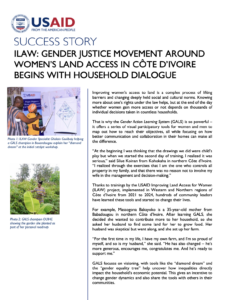 Improving women’s access to land is a complex process of lifting barriers and changing deeply held social and cultural norms. Knowing more about one’s rights under the law helps, but at the end of the day whether women gain more access or not depends on thousands of individual decisions taken in countless households.
Improving women’s access to land is a complex process of lifting barriers and changing deeply held social and cultural norms. Knowing more about one’s rights under the law helps, but at the end of the day whether women gain more access or not depends on thousands of individual decisions taken in countless households.
That is why the Gender Action Learning System (GALS) is so powerful – it offers a series of visual participatory tools for women and men to map out how to reach their objectives, all while focusing on how better communication and collaboration in their homes can make all the difference.
“At the beginning I was thinking that the drawings we did were child’s play but when we started the second day of training, I realized it was serious,” said Silue Koinan from Kohokaha in northern Côte d’Ivoire. “I realized through the exercises that I am the one who controls all property in my family, and that there was no reason not to involve my wife in the management and decision-making.”
Thanks to trainings by the USAID Improving Land Access for Women (ILAW) project, implemented in Western and Northern regions of Côte d’Ivoire from 2021 to 2024, hundreds of community leaders have learned these tools and started to change their lives.


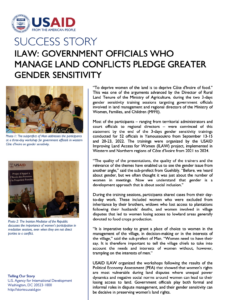 “To deprive women of the land is to deprive Côte d’Ivoire of food.” This was one of the arguments advanced by the Director of Rural Land Tenure of the Ministry of Agriculture, during the two 3-days gender sensitivity training sessions targeting government officials involved in land management and regional directors of the Ministry of Women, Families, and Children (MFFE).
“To deprive women of the land is to deprive Côte d’Ivoire of food.” This was one of the arguments advanced by the Director of Rural Land Tenure of the Ministry of Agriculture, during the two 3-days gender sensitivity training sessions targeting government officials involved in land management and regional directors of the Ministry of Women, Families, and Children (MFFE).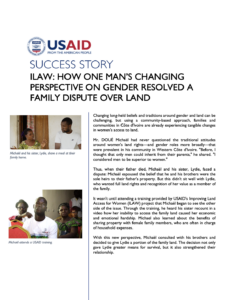 Changing long-held beliefs and traditions around gender and land can be challenging, but using a community-based approach, families and communities in Côte d’Ivoire are already experiencing tangible changes in women’s access to land.
Changing long-held beliefs and traditions around gender and land can be challenging, but using a community-based approach, families and communities in Côte d’Ivoire are already experiencing tangible changes in women’s access to land. “Things are changing,” said a young man from Litiangolo, northern Côte d’Ivoire, during a recent social dialogue session on women’s participation in land-based decision-making.
“Things are changing,” said a young man from Litiangolo, northern Côte d’Ivoire, during a recent social dialogue session on women’s participation in land-based decision-making.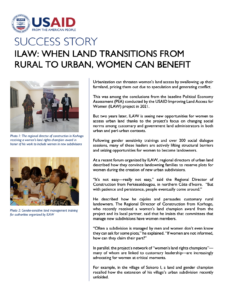 Urbanization can threaten women’s land access by swallowing up their farmland, pricing them out due to speculation and generating conflict.
Urbanization can threaten women’s land access by swallowing up their farmland, pricing them out due to speculation and generating conflict.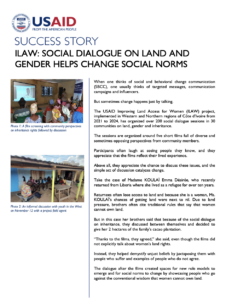 The USAID Improving Land Access for Women (ILAW) project, implemented in Western and Northern regions of Côte d’Ivoire from 2021 to 2024, has organized over 200 social dialogue sessions in 30 communities on land, gender and inheritance.
The USAID Improving Land Access for Women (ILAW) project, implemented in Western and Northern regions of Côte d’Ivoire from 2021 to 2024, has organized over 200 social dialogue sessions in 30 communities on land, gender and inheritance.